|
|
|
Sort Order |
|
|
|
Items / Page
|
|
|
|
|
|
|
| Srl | Item |
| 1 |
ID:
072837
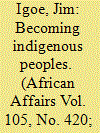

|
|
|
|
|
| Publication |
2006.
|
| Summary/Abstract |
Although the term 'indigenous' implies a state preceding that which is foreign or acquired, indigenous movements in Africa are a recent phenomenon. Drawing from the author's research of the Tanzanian indigenous peoples' movement in the 1990s, this article argues that indigenous identity in Tanzania does not represent miraculously preserved pre-colonial traditions or even a special sort of marginalization. Rather, it reflects the convergence of existing identity categories with shifting global structures of development and governance. Specifically, it reflects a combination of 'cultural distinctiveness' and effective strategies of extraversion in the context of economic and political liberalization. The Maasai, who are 'culturally distinct', and who have a long tradition of enrolling outsiders in their cause, naturally dominate this movement.
|
|
|
|
|
|
|
|
|
|
|
|
|
|
|
|
| 2 |
ID:
137568
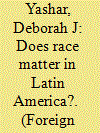

|
|
|
|
|
| Summary/Abstract |
In 1992, the Nobel Committee awarded its Peace Prize to Rigoberta Menchú Tum, the daughter of poor Guatemalan peasants, for her work promoting indigenous rights. Her prize, momentous in its own right, highlighted a sea change in Latin American politics. Throughout the 1980s and early 1990s, prominent indigenous movements had emerged in countries such as Bolivia, Ecuador, Guatemala, and Mexico. As a result, Latin American countries undertook unprecedented reforms to address ethnic diversity: politicians amended national constitutions to recognize indigenous people, passed laws supporting bicultural education and affirmative action, and added questions about race and ethnicity to official censuses.
|
|
|
|
|
|
|
|
|
|
|
|
|
|
|
|
| 3 |
ID:
086018
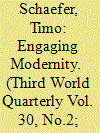

|
|
|
|
|
| Publication |
2009.
|
| Summary/Abstract |
Most analyses of the recent indigenous mobilisations in Bolivia and Ecuador (as well as other Latin American countries) have sharply divided the new indigenous politics from earlier class-based political projects of the left. The emergence and mass-appeal of indigenous movements, in these analyses, are rooted in ethnic and cultural cleavages between indigenous peoples and the rest of Bolivian and Ecuadorean society. This article argues that a political interpretation of indigenous movements in these countries gives a more coherent explanation for their historical trajectories as well as their present situation, in particular their high degree of articulation with other popular political actors. Its historical section describes the emergence of indigenous movements in Bolivia and Ecuador as part of an engagement with modernity that began in the first half of the twentieth century as part of the cross-ethnic projects of unions and radical parties of the traditional left and put indigenous communities into positive relationships to the modernizing Bolivian and Ecuadorean states.
|
|
|
|
|
|
|
|
|
|
|
|
|
|
|
|
| 4 |
ID:
129195
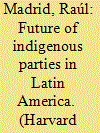

|
|
|
|
|
| Publication |
2014.
|
| Summary/Abstract |
After a long period of relative quiescence, indigenous movements in Latin America have mobilized. A wave of indigenous protests swept through the Andean countries beginning in the 1980s and made its presence felt as far north as Mexico. Indigenous groups have blocked roads, occupied buildings, and held mass rallies to let their demands be known. They have also entered the electoral arena in unprecedented numbers. Some indigenous groups and leaders have allied with non-indigenous parties, lending their support to the parties in exchange for candidacies or policy concessions. Other indigenous groups have opted to form their own political parties. In Bolivia, Colombia, Ecuador, and Guatemala, indigenous parties have launched presidential campaigns and in a host of other Latin American countries indigenous parties have competed in legislative or municipal elections.
Bolivia's Movement toward Socialism, known as the MAS for its Spanish initials, has been the most successful of the indigenous parties. The MAS has dominated Bolivian politics since 2005, winning every major election since that time. Its leader, Evo Morales, has occupied the presidency for the last eight years, and the MAS currently controls both houses of the Bolivian legislature as well as most of the country's departments.
|
|
|
|
|
|
|
|
|
|
|
|
|
|
|
|
| 5 |
ID:
085759
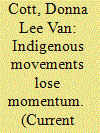

|
|
|
|
|
| Summary/Abstract |
Just a few years ago, the future looked bright
for Latin America's 40 million indigenous people.
Throughout the hemisphere and particularly
in the ethnically diverse Andes, indigenous
movements were converting protest into concrete
policy gains.
|
|
|
|
|
|
|
|
|
|
|
|
|
|
|
|
| 6 |
ID:
151286
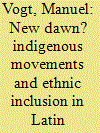

|
|
|
|
|
| Summary/Abstract |
This article investigates how indigenous movements in Latin America promote the political inclusion of historically marginalized indigenous groups. I argue that the social pressure produced by a strong movement promotes the inclusion of indigenous representatives in formal leadership positions. However, this effect depends on both the movement’s internal unity and the general responsiveness of the political system. I examine my claims using a mixed-methods design. I draw on a new group-level data set on ethnic parties and ethnic civil society organizations in Latin America between 1946 and 2009. My statistical analysis finds that indigenous groups with well-organized movements are more likely to achieve inclusion in executive positions of state power. The level of democratic freedom in a country greatly conditions this effect, while movement-internal factionalism undermines the political effectiveness of indigenous mobilization. I illuminate the causal mechanisms underlying these results in a case study of the rise and decline of indigenous mobilization in Ecuador.
|
|
|
|
|
|
|
|
|
|
|
|
|
|
|
|
| 7 |
ID:
090816
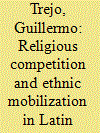

|
|
|
|
|
| Publication |
2009.
|
| Summary/Abstract |
This article suggests that a society's religious market structure can explain whether religion is "the opium of the people" or a major source of dissident secular mobilization. I present a simple model explaining why under monopolistic conditions, Catholic clergy in Latin America ignored the religious and social needs of poor rural indigenous parishioners but, when confronted by the expansion of U.S. mainline Protestantism, became major institutional promoters of rural indigenous causes. Catholic indigenous parishioners empowered by competition demanded the same benefits their Protestant neighbors were receiving: social services, ecclesiastic decentralization, and the practice of religion in their own language. Unable to decentralize ecclesiastic hierarchies, and facing a reputation deficit for having sided with rich and powerful elites for centuries, Catholic clergy stepped into the secular realm and became active promoters of indigenous movements and ethnic identities; they embraced the cause of the Indians as a member retention strategy and not in response to new doctrinal ideas emanating from Vatican II. Drawing on an original data set of indigenous mobilization in Mexico and on life histories and case studies, I provide quantitative and qualitative evidence of the causal effect of religious competition on the creation of the social bases for indigenous ethnic mobilization.
|
|
|
|
|
|
|
|
|
|
|
|
|
|
|
|
|
|
|
|
|